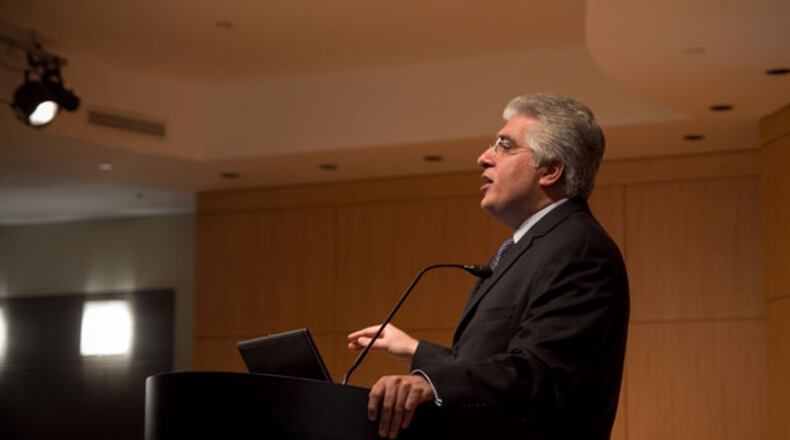If the next administration follows through on its promise to roil U.S. trade relations, the changes will likely dampen both hiring and housing in Atlanta next year, according to a highly-watched forecast.
The incoming president will be able to raise tariffs on imports, which would – at least in the short run – make products more expensive. Tougher trade policies will also raise the value of the dollar, which would chill demand for goods made here, said Rajeev Dhawan, director of the Economic Forecasting Center at Georgia State University.
Most important for the housing market, mortgage rates are rising already and a tussle over trade will accelerate the climb, he said during the center’s quarterly conference.
“Six months we can live with,” Dhawan said. “More than that, the Chinese won’t take it and it’s a trade war.”
Higher interest rates, higher prices and slower hiring would ripple through the economy.
“If you can prove to me that a trade war happens for a year and there is no impact on interest rates, then okay, don’t worry,” he said.
Domestically-based businesses will not feel a direct impact. But the big companies – those who do business overseas like Coca-Cola, Home Depot or Delta Air Lines – will take a hit, damage that will be echoed by their stock market values, Dhawan said. “If the dollar is getting stronger, my 401(k) is going to suffer.”
Some sectors will do better than others, he said: Banks, retailers and pharmaceutical companies, as well as leisure and hospitality, should do well. So growth will continue, but decelerate, according to the center's forecast.
Atlanta, which will add about 62,800 jobs this year, will see growth drop to 39,100 jobs next year before a modest recovery in 2018, he predicted: The hardest impact will be among manufacturing companies and large companies with international ties.
The state’s economy will add 86,700 jobs this year, he projects, but only 54,300 jobs next year.
In some ways, the economic hit will be worse than it appears, since the new jobs will be disproportionately lower-wage positions, he said: Just 18 percent of the new Atlanta jobs will be “premium” positions – that is, paying more than about $60,000 a year.
Trump’s surprise victory has already made an economic difference, he said. “This wasn’t my forecast in August.”
Longer term there are many questions about the new administration – and many ways that a new administration could boost the economy.
A surge of deficit spending on infrastructure, for example, could mean thousands of new jobs. Dhawan said he also expects a large corporate tax cut at some point, which would be an economic stimulus.
Neither of those would happen immediately or have a quick impact.
Moreover, many campaign vows will be diluted or dropped, but some are virtually inevitable, Dhawan said: Trade – like immigration – was a pillar of the Trump campaign.
Dhawan acknowledged that the new administration is only one factor in a global economy. Other variables can have a critical impact.
For example, energy prices. The low cost of oil the past two years has been like a tax break to American consumers. With producers continuing to pump, low prices may continue to grease the economic gears.
But there are also reasons to worry about a sudden loss of supply that would mean a spike in prices, he said.
Venezuela, the fourth-largest importer of oil to the United States, is struggling through political turmoil. In contrast, Atlanta’s recent experience with shortages was the September shutdown of the Colonial Pipeline, he said.
"That was a two-week problem," Dhawan said. "We just saw a glimpse of what would happen if Venezuela blows up and we don't have their oil."
___________________
Metro Atlanta: how many new jobs during the year?
2010 ……… 22,700
2011 ……… 41,700
2012 ……… 49,000
2013 ……… 78,100
2014 ……… 104,200
2015 ……… 69,700
2016 ……… 62,800*
2017 ……… 39,100*
2018 ……… 50,400*
*Forecast
Source: Economic Forecast Center, Georgia State University, Bureau of Labor Statistics
About the Author
Keep Reading
The Latest
Featured


